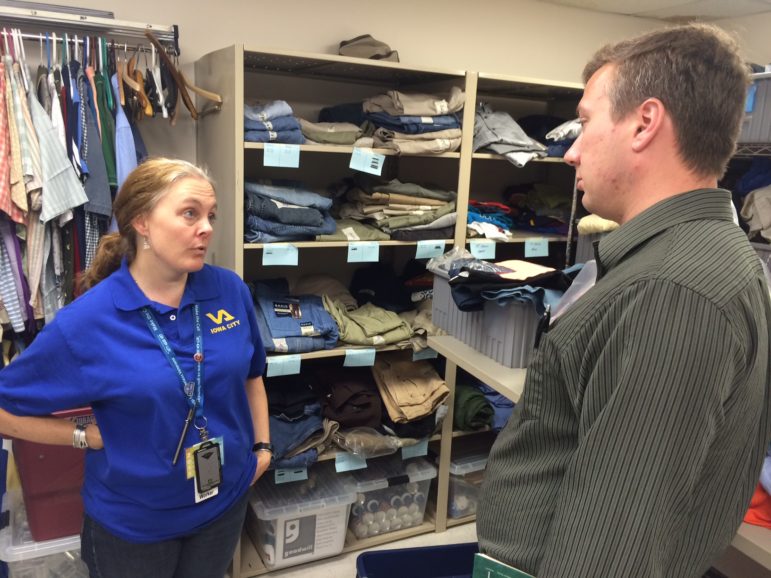Knight News Match raises more than $1.2 million

Summer intern Thomas Nelson, right, investigates why some Iowa homeless veterans miss out on Veterans Affairs services. (Photo: Lyle Muller/IowaWatch)
Dozens of nonprofit and public media organizations have raised more than $1.2 million through the Knight News Match, a matching gift program that the Knight Foundation will double to more than $2.4 million.
“This is yet another sign that the public is willing to pay for quality journalism,” said Jennifer Preston, the foundation’s VP of journalism.
To qualify for the match, participating organizations had to raise up to $25,000 in contributions of $1,000 or less from individuals. Knight will match up to that amount for each campaign, capped at a total of $1.5 million. The goal of the program, announced Dec. 19, was to encourage news organizations to cultivate new donors.
Organizations that met the match tended to have more sophisticated fundraising programs, regardless of the size of their operations, according to Preston. Public media organizations, including KQED in San Francisco, for example, met the gift challenge early.
The Institute for Nonprofit News participated in the News Match alongside nearly half of its 120 members. Smaller organizations generally didn’t reach the $25,000 limit, according to Sue Cross, executive director of INN. But they benefitted from the revenues they did bring in, as well as Knight’s efforts to raise awareness of nonprofit journalism and its need for public support, she said.
Quick turnaround for end-of-year match
The matching gift program came together within weeks.
During a meeting in early December, nonprofit news and public media leaders told Knight officials that they were seeing upticks in donations. Concerns about fake news during the general election had increased public awareness about the importance of journalism and appeared to be influencing more people to contribute. Based on the feedback, Knight’s president asked board members at a subsequent meeting to authorize the matching incentive program between December 19 and January 19.
Participating organizations learned of their eligibility days before the launch. Many were in the midst of their year-end campaigns.

Lyle Muller, Iowa Center for Public Affairs Journalism
“It was extra work nobody’s going to complain about,” said Lyle Muller, executive director and editor of Iowa Center for Public Affairs Journalism.
Knight Foundation selected 57 recently or currently funded organizations. Public media stations, such as Georgia Public Broadcasting in Macon, were chosen because they are located in cities where Knight invests. Knight also supports local journalism in Philadelphia; Detroit; Akron, Ohio; and Charlotte, N.C.
“I got a few emails from people wondering, ‘Hey, what about me?’ … [W]e focused on public media in Knight cities,” Preston said. In selecting not-for-profit newsrooms, Knight “included almost everyone from the last two and three years that we work with,” she said.
The renewed attention to credibility in news reporting, as well as Knight’s investment in its social media and advertising campaigns, helped raise awareness of nonprofit news outlets and their needs, Cross said.

Sue Cross, INN
“That’s really lead-generation for everybody, and raising awareness for everybody,” Cross said. “It’s very hard to measure the exact outcome of that, but I suspect it will pay off for a long time.”
The match encouraged smaller nonprofits to boost their fundraising efforts. All drew new supporters, Cross said. To support its members, INN provided coaching, sample scripts for outreach and training sessions.
“When you have a foundation say, ‘Hey, we’re going to make up to $1.5 million available and it will help a big chunk of your members,’ we wanted to jump and do everything we could to help people take advantage of it,” Cross said.
How organizations leveraged the match
Launch of the matching incentive coincided with year-end campaigns that organizations were already promoting, helping to boost their revenues.
For nonprofit newsrooms like the Wisconsin Center for Investigative Journalism, which aims to double its $500,000 budget, it resulted in big year-end increases.

Andy Hall, Wisconsin Center for Investigative Journalism
The uptick in donations first began after Election Day and continued with the match, said Andy Hall, executive director.
Launched in 2009, WCIJ had 214 individual contributors as of Nov. 1, 2016. As its matching gift fundraiser drew to its end Jan. 19, it had received 249 gifts totaling more than $55,000, and 96 new donors contributed toward the Knight-backed campaign. Its total number of donors had grown to 356.
WCIJ went into “high gear” when it received notice of the match four days before the kick off, mobilizing its development team, board and volunteers who work in the nonprofit fundraising industry, Hall said.
Using a matrix outlining its various audiences and communication channels, the campaign sent out a series of timed, pre-written newsletters with messages that were focused on the center’s values — protect the vulnerable, expose wrongdoing, seek solutions. Each message was tweaked to promote the match.
Hall attributed the campaign’s success to several factors, including the strength of WCIJ’s team and its ability to leverage board contacts, carefully track donors and use social media for both public engagement and marketing.
“At its heart, it’s simple,” Hall said. “It’s just like a reporter has a contact list; you try to keep track of who your sources are and you try to know something about your sources.”
“One of the things I’ve learned since launching WCIJ in 2009 is that for investigative reporting to flourish, it has to be supported by a strong business model,” Hall said. “There’s no magic formula for attaining success on the business side. It turns out that it’s very similar to how to succeed in investigative reporting: hard work pays off.”
Thanks to your generosity, we reached our $25k @knightfdn #NewsMatch grant goal. Here are our amazing supporters: https://t.co/ZIM9EHZoY7 pic.twitter.com/BL2MqPlop1
— Wisconsin Watch (@WisconsinWatch) January 5, 2017
After WCIJ reached its matching goal on Jan. 5, donors continued to write checks and send online gifts, Hall said. The donors represented 15 states plus Washington, D.C., and Australia.
ICPAJ collected donations from far-flung places as well, including Montreal, San Francisco and Austin, Texas. Muller credits the wider interest to the organization’s association with the Knight Foundation. In a thank-you email to donors, he invited them to check out their local nonprofit news organizations.

A recent ICPAJ reporting series examined water quality of 30 private wells in southwest Iowa. (Photo: Lauren Shotwell/IowaWatch)
ICPAJ didn’t meet the $25,000 match, but Muller described the campaign as successful. “We didn’t get the big money like the big boys get, but us being at this point a one-person operation, working with volunteers and a contract employee, we did really well,” Muller said.
The match drew contributions from 62 individuals, including two donors who gave twice. As of Monday morning, ICPAJ raised $15,030.50, of which $9,530.50 is eligible for the match, Muller said. When results from its Knight News Match and year-end Giving Tuesday campaign were combined, the organization surpassed the 80 individual donors and businesses that gave to ICPAJ October 2015 and October 2016, Muller said.
The matching period is over, but ICPAJ is using the momentum to continue its fundraising efforts. Muller plans to send a newsletter this week thanking donors and making a passive ask. “We’ve told folks that even though the fund drive is done, you can still donate,” Muller said. “It won’t be eligible for the match, but it’ll help IowaWatch.”
Next steps
Nonprofit news leaders say they would have benefitted from having more lead time for their campaigns. For many organizations, the match conflicted with their planned year-end fundraisers and funding requests to larger, more bureaucratic institutions, which needed time to gain approvals to cut large checks.
ICPAJ kicked off its Giving Tuesday campaign Nov. 29. When the Knight News Match started four weeks later, a number of board members had already made donations. Those contributions “would have been nice to have for the Knight campaign, but you just don’t complain about gifts,” Muller said.

Jennifer Preston, Knight Foundation
The News Match program is enabling Knight to learn about the fundraising capabilities of nonprofit news organizations and how the foundation can help them build their fundraising capacity in the future, according to Preston.
Matching gifts, a longstanding practice of public broadcasting pledge drives, are widely known to encourage individual giving.
“What we’re learning is that some organizations like Voice of San Diego and MinnPost have solid, sophisticated fundraising expertise and we know that’s key for nonprofit journalism to succeed, to be able to find and build a dedicated audience,” Preston said.
Knight is evaluating the program to understand what worked and how it can help organizations beyond putting more money into the field, Preston said. She’d like to create a way for nonprofit leaders to share information on best practices and nitty-gritty topics like processing credit card payments and building email lists.
Before deciding whether to re-implement the program, Knight will solicit feedback during its annual convening of nonprofit leaders at the Investigative Reporters and Editors conference this summer. It’s also open to partnering with other journalism funders. “I have to really make sure that we do the evaluation and do the assessment and make sure it worked for the field,” Preston said.
Current is a member of the Institute for Nonprofit News.




